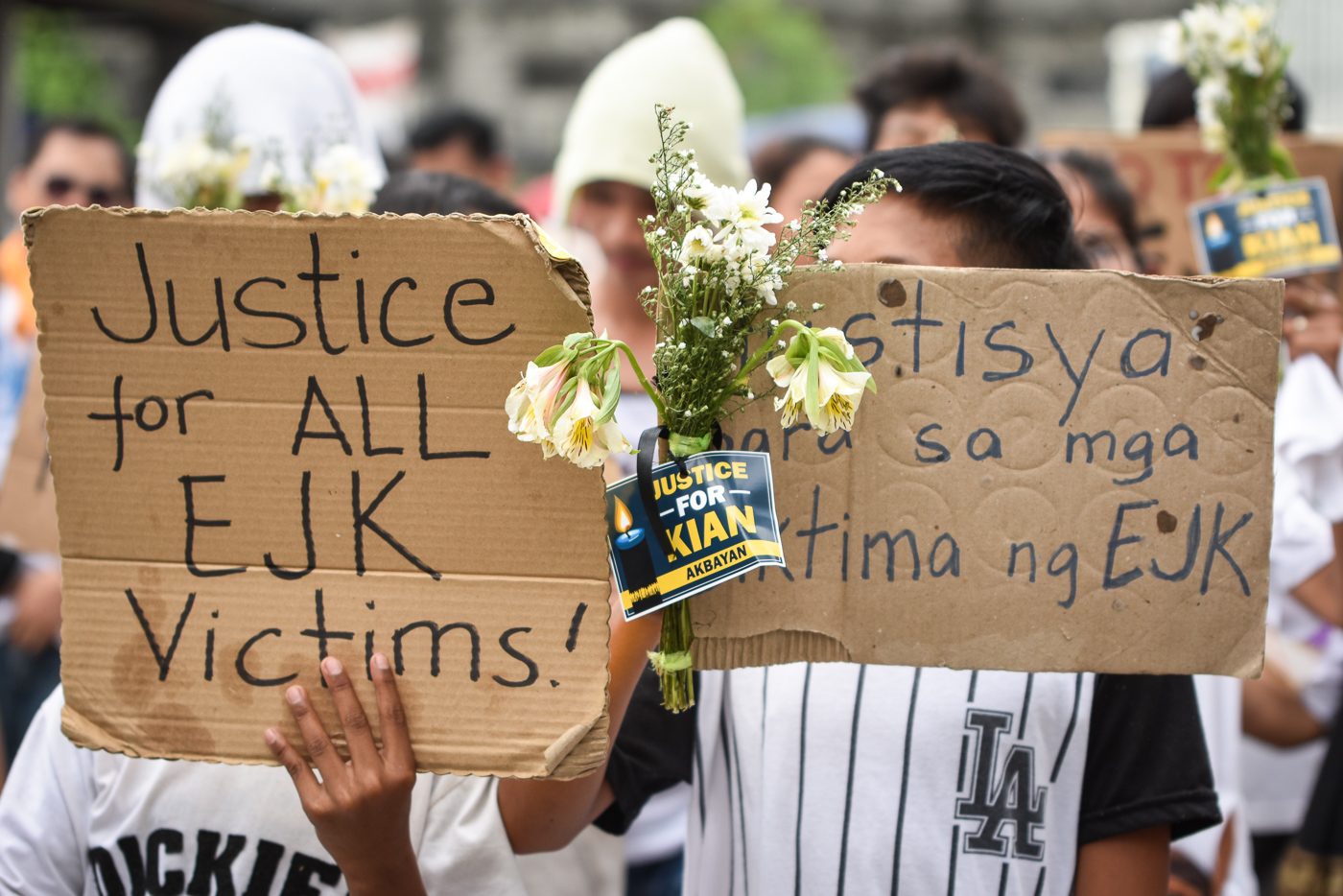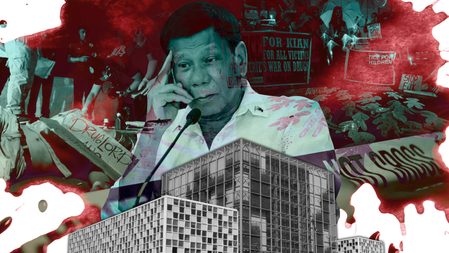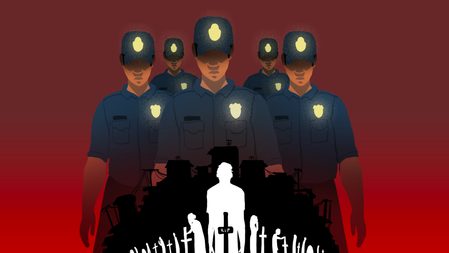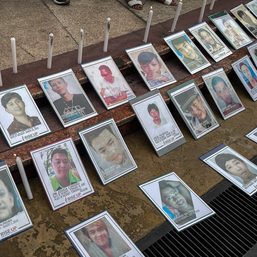SUMMARY
This is AI generated summarization, which may have errors. For context, always refer to the full article.

MANILA, Philippines – Victims and their families “unanimously and strongly urge” the International Criminal Court (ICC) to continue investigations into the violent war on drugs (WoD) associated with former president Rodrigo Duterte as justice for them remains elusive.
This was the conclusion of a consultation process initiated by the ICC Registry’s Victims Participation and Reparations Section (VPRS), according to a 21-page public redacted report dated May 22, 2023.
“In all communications received by the VPRS, victims unanimously support an ICC investigation into crimes against humanity allegedly committed in the context of the WoD in the Philippines between 1 November 2011 and 17 March 2019,” the report said.
The victim consultation process was launched upon instructions of the ICC’s appeals chamber, after it stopped the Philippine government’s attempt to block this effort. In its March 21 decision, the chamber said it “considers it appropriate for victims to be involved in these appeals proceedings.”
The consultation process received five victim representations containing views and concerns expressed on behalf of 350 individual victims and 165 families. According to the report, it aims to “provide an overview, in the victims’ own words and the words of their representatives, of the victims’ attempts to obtain justice in the Philippines, their current situation, as well as relevant contextual information which may assist” the appeal proceedings.
Government data shows that at least 6,252 people died at the hands of the police during anti-illegal drug operations as of May 31, 2022. This tally does not include victims of vigilante-style killings, which, according to human rights groups, pull the number up to around 30,000.
This is the latest registry report released by the VPRS. The VPRS in August 2021 also found that victims “overwhelmingly support an investigation” into Duterte’s war on drugs, based on at least 204 representations of victims and their families.
Challenges in obtaining justice
In supporting the resumption of Prosecutor Karim Khan’s investigation, the victims and their families said that “justice and accountability in the Philippines remain largely elusive and victims and victims’ families face enormous difficulties in seeking accountability using available domestic legal remedies.”
The victims’ support of a continuing probe hinges on their view that there is still no prospect of a genuine investigation and prosecution in the Philippines. They pointed to the lack of proper documentation and genuine state intervention, among others.
One quote in the report said that “victims of rights violations have been unable to pursue remedies under a prevalent climate of fear and impunity, and more pointedly, have been unable to access the justice system with massive institutional challenges.”
Another victim’s kin lamented that the Philippine justice system is “traumatic,” adding that their “cases were not seriously investigated, but only recorded in their police record, they said our children were collateral damage in what they claimed to be a police operation.”
Families also continue to fear for their lives, as they face harassment and intimidation from authorities, including police in their own communities. The report quoted one submission that noted incidents where families are invited to police stations to collect information, as well as subjected to constant police visitations in their own homes.
“To this day, they live in constant fear for their lives and are continually retraumatized by their exposure to criminal elements that are still protected by impunity and remain unchanged,” the report noted.
Only a few have been convicted in drug war-related killings, including the policemen involved in the deaths of 17-year-old Kian delos Santos, Carl Angelo Arnaiz, and Reynaldo “Kulot” de Guzman.
Inaction under Marcos
The end of Duterte’s presidency did not change the situation, as Marcos’ continued inaction has brought about more problems and challenges to families. The families “emphasized the fact that [Duterte’s] campaign continues under the current administration and there is no prospect for victims to obtain justice at the domestic level.”
One victim representation stated that the Marcos administration remains unwilling to investigate, with authorities outrightly dismissing them when they asked for help in getting justice. Police and barangay (village) authorities also went around to ask families to sign waivers indicating they are no longer interested in filing cases.
There were also documented incidents wherein families were asked to pay police to get help in the investigation.
“We thought there will be changes under the new government in the method of addressing drug problems, so we came to the authorities between July and August last year to request that the cases of our relatives be investigated so we can get justice, the authorities just laughed at us and said our relatives were killed during the Duterte administration so the investigation is already closed and does not need to be opened unless it’s a new case because we already have a new government,” according to one representation.
The report also noted sentiments against the continued killings under Marcos as “families of these recent cases also shared that they did not get any form of justice.”
Dahas, a project of the University of the Philippines-Diliman Third World Studies Center, monitored at least 294 reported drug-related killings under the Marcos administration, as of May 17, 2023. At least 106 were killed during legitimate government operations between June 30, 2022, to May 7, 2023.
Reflect other cases
The views and representations of victims and their families submitted to the ICC mirror several other cases documented by Rappler as part of its reporting on the violent war on drugs and its aftermath over the years.
Families, who continue to face challenges at the domestic level, are pining their hopes on the international court to give justice to their loved ones, and to run after Duterte himself.
But the Philippine government under Marcos has appealed the recent decision of the ICC’s pre-trial chamber that allowed Prosecutor Khan to reopen his investigation into the war on drugs. Several lawmakers also filed resolutions urging Congress to declare their “unequivocal defense” of the former president.
The submission is the latest development at the ICC in relation to Duterte’s brutal war on drugs. On May 16, the Philippine government government replied to Khan’s points against the appeal. In its filing, the government again falsely claimed that the ICC has no jurisdiction over the Philippine case. – Rappler.com
Add a comment
How does this make you feel?




![[The Slingshot] Lito Patay’s 4 hours and 38 minutes of infamy](https://www.rappler.com/tachyon/2024/07/Lito-Patay-4-hours-infamy-July-19-2024.jpg?resize=257%2C257&crop=233px%2C0px%2C720px%2C720px)

![[The Slingshot] A Duterte and Bato cop named Patay](https://www.rappler.com/tachyon/2024/06/tl-lito-patay.jpg?resize=257%2C257&crop=322px%2C0px%2C720px%2C720px)



![[EDITORIAL] Sorry Arnie Teves, walang golf sa kulungan](https://www.rappler.com/tachyon/2024/03/animated-arnie-teves-arrest-carousel.jpg?resize=257%2C257&crop=310px%2C0px%2C720px%2C720px)






![[OPINION] Rodrigo Duterte and his ‘unconditional love’ for China](https://www.rappler.com/tachyon/2024/04/rodrigo-duterte-xi-jinping-august-2019.jpeg?resize=257%2C257&crop=91px%2C0px%2C900px%2C900px)




There are no comments yet. Add your comment to start the conversation.